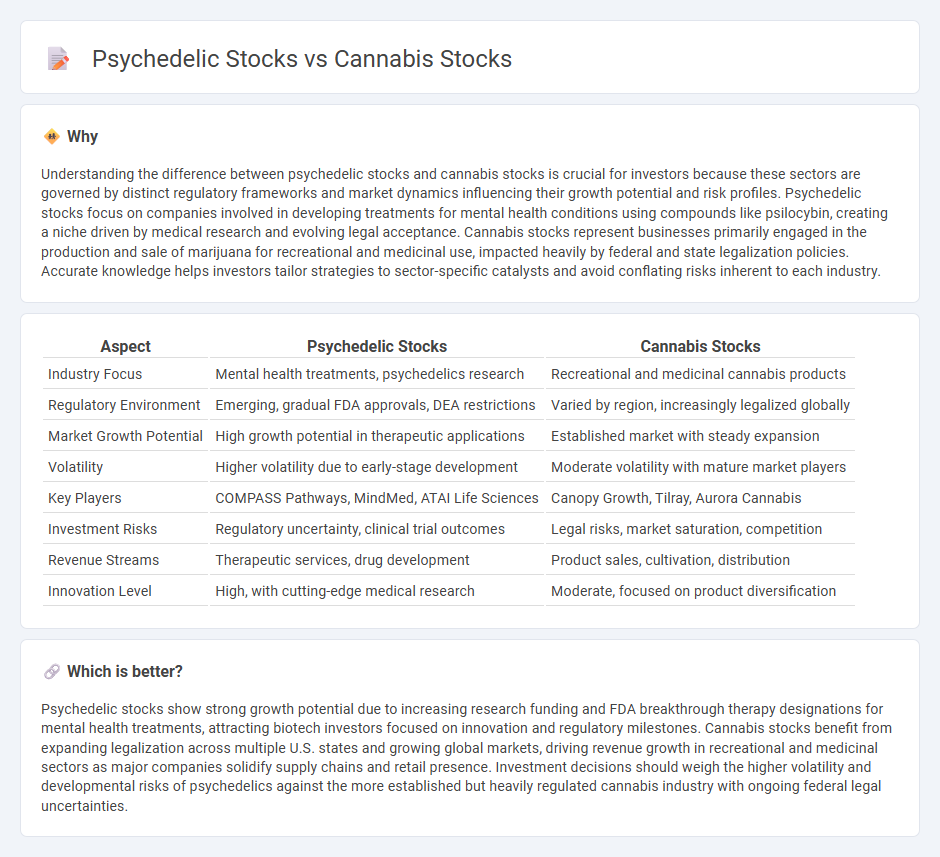
Psychedelic stocks focus on companies developing mental health therapies using compounds like psilocybin and MDMA, targeting conditions such as depression and PTSD. Cannabis stocks involve businesses in cultivation, distribution, and product development within the legal marijuana industry, including recreational and medicinal markets. Explore the differences in growth potential, regulatory challenges, and market dynamics to make informed investment decisions.
Why it is important
Understanding the difference between psychedelic stocks and cannabis stocks is crucial for investors because these sectors are governed by distinct regulatory frameworks and market dynamics influencing their growth potential and risk profiles. Psychedelic stocks focus on companies involved in developing treatments for mental health conditions using compounds like psilocybin, creating a niche driven by medical research and evolving legal acceptance. Cannabis stocks represent businesses primarily engaged in the production and sale of marijuana for recreational and medicinal use, impacted heavily by federal and state legalization policies. Accurate knowledge helps investors tailor strategies to sector-specific catalysts and avoid conflating risks inherent to each industry.
Comparison Table
| Aspect | Psychedelic Stocks | Cannabis Stocks |
|---|---|---|
| Industry Focus | Mental health treatments, psychedelics research | Recreational and medicinal cannabis products |
| Regulatory Environment | Emerging, gradual FDA approvals, DEA restrictions | Varied by region, increasingly legalized globally |
| Market Growth Potential | High growth potential in therapeutic applications | Established market with steady expansion |
| Volatility | Higher volatility due to early-stage development | Moderate volatility with mature market players |
| Key Players | COMPASS Pathways, MindMed, ATAI Life Sciences | Canopy Growth, Tilray, Aurora Cannabis |
| Investment Risks | Regulatory uncertainty, clinical trial outcomes | Legal risks, market saturation, competition |
| Revenue Streams | Therapeutic services, drug development | Product sales, cultivation, distribution |
| Innovation Level | High, with cutting-edge medical research | Moderate, focused on product diversification |
Which is better?
Psychedelic stocks show strong growth potential due to increasing research funding and FDA breakthrough therapy designations for mental health treatments, attracting biotech investors focused on innovation and regulatory milestones. Cannabis stocks benefit from expanding legalization across multiple U.S. states and growing global markets, driving revenue growth in recreational and medicinal sectors as major companies solidify supply chains and retail presence. Investment decisions should weigh the higher volatility and developmental risks of psychedelics against the more established but heavily regulated cannabis industry with ongoing federal legal uncertainties.
Connection
Psychedelic stocks and cannabis stocks share a strong connection through their focus on alternative medicine and mental health treatments, attracting investors interested in the growing wellness and therapeutic markets. Both sectors benefit from changing regulatory landscapes and increasing public acceptance, which drive market growth and investment potential. The convergence of research on cannabinoids and psychedelics for mental health disorders further strengthens the correlation between these two investment categories.
Key Terms
Regulatory Environment
Cannabis stocks face fluctuating regulatory challenges due to varied legalization status across U.S. states and ongoing federal restrictions, impacting market volatility and investment risk. Psychedelic stocks are navigating emerging regulatory frameworks, with increasing FDA-approved clinical trials accelerating potential medical use approvals. Explore how evolving policies shape investment opportunities in both markets.
Market Capitalization
Cannabis stocks exhibit larger market capitalization, often exceeding $10 billion for major companies like Canopy Growth and Tilray, reflecting widespread legalization and consumer acceptance. Psychedelic stocks, such as MindMed and COMPASS Pathways, tend to have smaller market caps generally below $5 billion, driven by nascent clinical research and evolving regulatory frameworks. Explore detailed market capitalization trends to understand investment potential in both sectors.
Clinical Trial Pipeline
Cannabis stocks and psychedelic stocks differ significantly in their clinical trial pipelines, with psychedelics showing a robust presence in advanced-stage trials targeting mental health disorders such as depression and PTSD. Cannabis companies primarily focus on trials related to pain management, epilepsy, and inflammation, but face regulatory hurdles that can slow approval processes. Explore the evolving clinical landscapes to understand investment potential and innovation trajectories in both sectors.
Source and External Links
How to Buy Marijuana Stocks - Highlights top-performing cannabis stocks like Turning Point Brands (TPB), WM Technology (MAPS), and Village Farms (VFF), all listed on major U.S. exchanges, but notes ongoing regulatory risks as the U.S. maintains federal restrictions.
Global Cannabis Stock Index - Compiles a broad global index of cannabis stocks, including major companies such as Canopy Growth (CGC), Tilray (TLRY), and Aurora Cannabis (ACB), with strict liquidity and exchange requirements for inclusion.
Cannabis Stocks - Lists current quotes for major cannabis stocks like Green Thumb Industries (GTBIF), Cronos Group (CRON), Trulieve Cannabis (TCNNF), Curaleaf (CURLF), and Tilray (TLRY), and features updates on recent company news and quarterly earnings.
 dowidth.com
dowidth.com